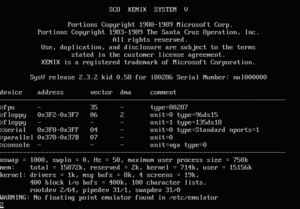Xenix

Xenix under Bochs
|
|
| Developer | Microsoft, SCO, various resellers |
|---|---|
| OS family | Unix |
| Working state | Historic |
| Source model | Closed source |
| Initial release | 1980 |
| Latest release | System V release 2.3.4 / 1989 |
| Platforms | PC/XT, x86, PDP-11, Z8001, 68k |
| Kernel type | Monolithic kernel |
| License | Proprietary |
| Succeeded by | SCO UNIX |
Xenix is a discontinued version of the Unix operating system for various microcomputer platforms, licensed by Microsoft from AT&T Corporation in the late 1970s. The Santa Cruz Operation (SCO) later acquired exclusive rights to the software, and eventually replaced it with SCO UNIX (now known as SCO OpenServer).
In the mid-to-late 1980s, Xenix was the most common Unix variant, measured according to the number of machines on which it was installed. Microsoft chairman Bill Gates said in 1996 that for a long time that company had the highest-volume AT&T Unix license.
Bell Labs, the developer of Unix, was part of the regulated Bell System and could not sell Unix directly to end customers. It instead licensed the software to others. Microsoft, which expected that Unix would be its operating system of the future when personal computers became powerful enough, purchased a license for Version 7 Unix from AT&T in 1978, and announced on August 25, 1980, that it would make it available for the 16-bit microcomputer market. Because Microsoft was not able to license the "UNIX" name itself, the company gave it an original name.
Microsoft, in turn, did not sell Xenix directly to end users; instead, they licensed it to OEMs such as IBM, Intel, Management Systems Development,Tandy, Altos, SCO, and Siemens (SINIX) who then ported it to their own proprietary computer architectures.
Microsoft Xenix originally ran on the PDP-11. The first port was for the Zilog Z8001 16-bit processor: the first customer ship was January 1981 for Central Data Corporation of Illinois, followed in March 1981 by Paradyne Corporation's Z8001 product. The first 8086 port was for the Altos Computer Systems' non-PC-compatible 8600-series computers (first customer ship date Q1 1982).
...
Wikipedia
